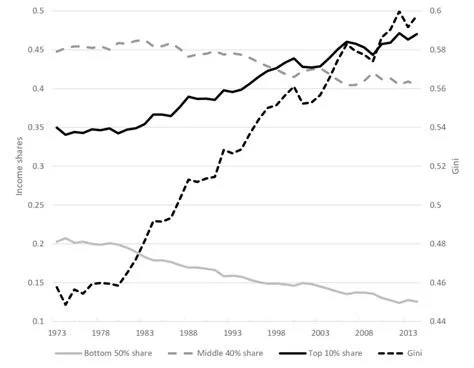AI’s Raised Bar Paradox
Quality is never an accident; it is always the result of intelligent effort. —John Ruskin
The best way to keep a prisoner from escaping is to make sure he never knows he's in prison. —Fyodor Dostoyevsky
Above: Inequality, plotted.
ChatGPT just wrote 1,000 blog-posts while you made your cup of morning joe. Now what?
AI turns mediocre into mass-produced and excellence into an arms race. Good-enough becomes automatic, while exceptional is pushed to superhuman heights. In the greatest Red Queen’s race of all time, standing still means sliding backward.
In a world where mediocrity is abundant and worthless, genuine craft becomes premium.
This turns two bits of folk wisdom on their heads:
“Just do it.” Not anymore. Just doing it means joining a landfill of half-baked content
“Done is better than perfect.” In an AI glut, excellent is the only thing that still pays
In this world, “ready, aim, fire” beats “ready, fire, aim.” It’s not enough to just throw things at the wall; you have to pick the right wall first.
Or, in the words of Abraham Lincoln, “Give me six hours to chop down a tree and I will spend the first four sharpening the axe.”
Call the coming shock the Gini Spike. But this inequality jolt is measured not only in dollars, but also cognitive autonomy.
As Adam Singer wrote:
A 206-page research paper [entitled Your Brain on ChatGPT: Accumulation of Cognitive Debt when Using an AI Assistant for Essay Writing Task states:] "LLM users consistently underperformed at neural, linguistic, and behavioral levels." This study found LLM dependence weakens the writer’s own neural and linguistic fingerprints. Relying on EEG, text mining, and a cross-over session, the authors show keeping some AI-free practice time protects memory circuits and encourages richer language even when a tool is later reintroduced.
In this future, it’s not just about who has capital, but who retains the capacity for independent thought and creative problem-solving.
The Gini Spike Mechanisms
Cognitive Hollowing Out: AI is gutting middle-tier knowledge work, the traditional backbone of economic mobility.
Winner-Take-All Dynamics: Those who maintain their creative and analytical edge will command premium wages, while those who become AI-dependent will see their skills commoditized and wages compressed.
Capital Concentration: tools are expensive to develop and deploy at scale, concentrating wealth among those who own the infrastructure rather than those who use it.
Network Effects: The best AI-augmented workers will increasingly dominate their fields, creating superstar effects where small advantages compound into massive inequalities. The proverbial 10X engineer becomes a 10,000X engineer.
When creativity turns into prompt-engineering, the true scarce resource becomes unprompted imagination.
So, in the words of Steven Tyler, “Dream On.”








